China on Tuesday urged Japan to respect historical realities, end provocations, teach the younger generation the correct perspective of history, and improve its relations with its neighbors.
Foreign Ministry spokeswoman Hua Chunying made the remarks after the Japanese Education Ministry announced it is revising junior and senior high school teaching manuals to state Tokyo's claim to sovereignty over China's Diaoyu Islands. Tokyo claims the islands are an "integral part of Japan".
Japanese Education Minister Hakubun Shimomura said the manuals will add a reference to the Diaoyu Islands — at the center of a tense standoff with China — and reiterated Tokyo's claim that the islands are an integral part of Japanese territory, and there is no dispute over their ownership.
The Foreign Ministry sharply criticized the announcement.
"The Diaoyu Islands have been part of Chinese territory since ancient times," Hua said at a daily news briefing in Beijing.
"Regardless of how the Japanese government promotes its erroneous position, it cannot change the basic fact that the Diaoyu Islands belong to China."
Japanese Prime Minister Shinzo Abe has sought to revise Japanese education manuals to garner more support for his rightist agenda from the Japanese public, said Zhang Yong, an expert from the Institute of Japanese Studies at the Chinese Academy of Social Sciences.
"Abe wants to expand his definition about Japan's territory and expects Japanese people to accept his definition and follow his policies. The best way for Abe to do so is through educating the younger generation," Zhang said.
The manual contains government guidelines for teaching, and has a major influence over the textbook screening process, as the government compels all textbooks to follow the manual.
Japan usually revises the guidelines and its manual every 10 years, and the next revision was supposed to take place in 2016.
Zhang said that Japan has been revising its manuals for many years, and the Japanese history-teaching manuals have always been an issue between Japan and China.
"But Japan never had such a high-profile revision. The Abe administration's pushing the revision earlier than scheduled is part of the trend of growing right-wing forces in Japan," he added.
Tokyo and Seoul are also at odds over a pair of islets in the Sea of Japan (Known as East Sea in South Korea). South Korea calls the islets Dokdo while Japan calls them Takeshima.
Shimomura said that the manuals will be changed to state clearly that the rocky islets, controlled by South Korea but claimed by both nations, are Japanese territory.
South Korea's Foreign Ministry promptly summoned the Japanese ambassador to protest.
"Our government strongly condemns this and asks Japan to immediately withdraw the revision" it said in a statement.
Many Japanese bloggers hold strong differing opinions about the revision of teaching manuals on Japanese history, including the Nanjing Massacre, the mass sexual enslavement of "comfort women" during World War II, and territorial disputes with China and South Korea.
"Why must stupid political and ideological battles always be fought out in the classroom? Why can't they just tell the kids the truth that the islands are disputed so that they'll know there's an issue to be resolved and not just to stick their heads in the sand?" one Japanese blogger said.
Another said: "It's like they (Japanese politicians) want the conflict with China and South Korea. They just keep mucking it up and making it harder for themselves."
The Abe administration is changing the way history is taught in Japanese schools, saying it wants to replace "masochistic" history with "patriotic" history.
However, "I don't see masochistic views in Japan's historical education. On the contrary, Japan needs to tell its people the truth about the war," said Hiroshi Tanaka, an emeritus scholar on Japan's attitudes toward World War II at Tokyo's Hitotsubashi University.
Reuters contributed to this story.
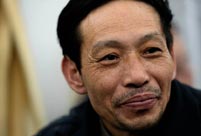 A 60-hour journey home
A 60-hour journey home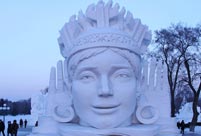 Int'l Snow Sculpture Art Expo
Int'l Snow Sculpture Art Expo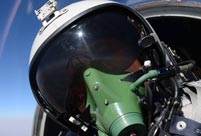 Highlights of China's air force
Highlights of China's air force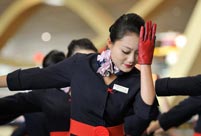 Airline crew stage flashmob dance at Kunming airport
Airline crew stage flashmob dance at Kunming airport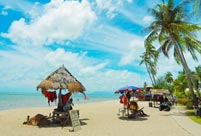 Top15 countries to retire to in 2014
Top15 countries to retire to in 2014 Hot supermodel's new photo album released
Hot supermodel's new photo album released Asia's heaviest box girder finishes 'rotation' in Wuhan
Asia's heaviest box girder finishes 'rotation' in Wuhan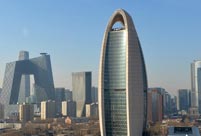 Completed facade of People's Daily new headquarters
Completed facade of People's Daily new headquarters Chinese-branded car passes North America standard safety test for the first time
Chinese-branded car passes North America standard safety test for the first time Li Na beats Bouchard to reach Australian final
Li Na beats Bouchard to reach Australian final  Explore the sources of PM 2.5
Explore the sources of PM 2.5 Highlights of Chinese airborne troops'exercises
Highlights of Chinese airborne troops'exercises  'Living in ice house' competition held in central China
'Living in ice house' competition held in central China  Chinese figure in Oscar nominations
Chinese figure in Oscar nominations  Top ten aerospace events in China 2013
Top ten aerospace events in China 2013Day|Week|Month